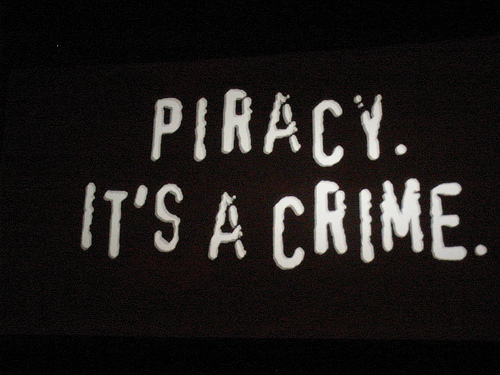If you’ve followed tech news over the last couple of years, you may have heard of the “6 strike” plan outlined by some major American Internet Service Providers (ISPs) with the goal of curbing piracy. After almost two years of delays, this policy is set to be rolled in starting this Monday. So far it has been reported that at least AT&T, Time Warner Cable, Verizon, Comcast, and Cablevision will be participating.
Essentially, strikes 1 and 2 will result in a warning e-mail or phone calling reminding you that you may have broken the law, strikes 3-4 will require you to watch some educational videos, and steps 5-6 will result in a reduced Internet connection speed. It is modeled after similar programs already existing in France in New Zealand. So far most of our information is based off of statements from Verizon, although other ISPs have hinted at the possibility of temporarily limited access to certain websites, or blocking internet access altogether. The latter is highly unlikely, because ISPs kind of want to keep their customers.
Many news sources have reported on the reported consequences, but few have made any attempt to ask the more burning question of how they plan to implement it, and what this means for the average consumer. Well, now Mr. Geek will bring you some insights into the reality of the issue instead of just more spin from the companies and copyright lobbies.
- This will only catch a small number of pirates, and possibly innocent gamers. With existing technology, the only reliable way to catch pirates is through BitTorrent. This is a type of file sharing service where dozens to thousands of users host the same file, and propagate it amongst each other. Therefore, it’s virtually impossible to remove the file once it’s been distributed to a few dozen people. The downside is that BitTorrent traffic is easy to recognize by ISPs since connecting to thousands of different computers at once is like a big red flag, and film producers have been known to place “bait” files that record the IP addresses of the users who download them.
Since not all pirates use BitTorrent and not all BitTorrent users are pirates, this inevitably means that very few pirates will be caught and a number of innocent people will receive alerts. It may also affect people who host web servers, multi-player video game servers, and other such services from their home, since this would create a similar pattern of multiple concurrent connections. It’s very unfair to the average user. This would be like if the traffic cops issued everyone a ticket for driving down a certain street without actually checking their speeds, just because some people speed in that location. - The so-called “warnings” will likely be ineffective. Sources have reported that warnings will take the form of e-mails, phone calls, web browser pop-ups, “educational” videos, and temporarily reduced internet speeds, none of which are likely to deter pirates. The e-mails will probably be left unopened and the phone calls will be treated as telemarketers. The browser pop-ups will be thought of as annoying but quickly dismissed. As for the educational videos, I can already see the thousands of YouTube parodies mocking them. For a sneak peak at what these may look like, see their little promotional video at the bottom of this article.
Furthermore, many news sources have reported that the slowed-down speeds will be “like dial-up.” Well, no, not exactly. The best estimate is that they would be slowed down to around 256 KB/s, or about a quarter to an eighth of the speed most American home users. It might sound slow to European users who are used to getting speeds of 100 MB/s or more, but the truth is that it’s comparable to Basic DSL speeds, and is sufficient for most web browsing.I get a similar speed on my Wi-Fi connection at work and never have issues loading websites, and am still able to stream 720p videos with few issues. Yes, the slower speed might hamper downloading of large files for the 2-3 days that it’s active, but there’s no way that it would deter an avid pirate from continuing in his ways. At my university I sometimes get speeds of only 28 Kb/s when many people are using Wi-Fi at once: now that is most definitely very annoying and comparable to dial-up, but it’s not what’s being proposed by the ISPs in question here.
- There will be no real enforcement. When Verizon was asked what would happen after the “6th strike,” their answer was essentially “nothing.” That’s right, it seems after you’ve exhausted your six strikes, you will go back to the usual system of perhaps being sent a threatening letter by the copyright claimer and even less likely being summonsed to court to be sued on copyright violations. We’ve already seen how (in)effective that has been, which is the reason why they’ve been searching for other means of catching pirates.
- Copyright Alert promotional video (YouTube)
- Background info about the program (techdirt)
- More background info (TorrentFreak)
- How pirates will be able to just avoid the warnings in the first place (Computerworld)
- Even FBI employees are pirates (TorrentFreak)
About Jeremy Andrews
Freelance PHP/MySQL developer, tech support guy, travel agent, transit photographer, and lover of poutine. Jeremy Andrews is a young guy from Montreal, Canada who enjoys writing about technology, can develop a website, and can do your travel arrangements! Contact him today at jeremy@jerail.ca for more info on any of these services.

















Pingback: You Will Be Warned: ISPs Roll Out Their Anti-Piracy Alert Systems | Florida State Tribune()